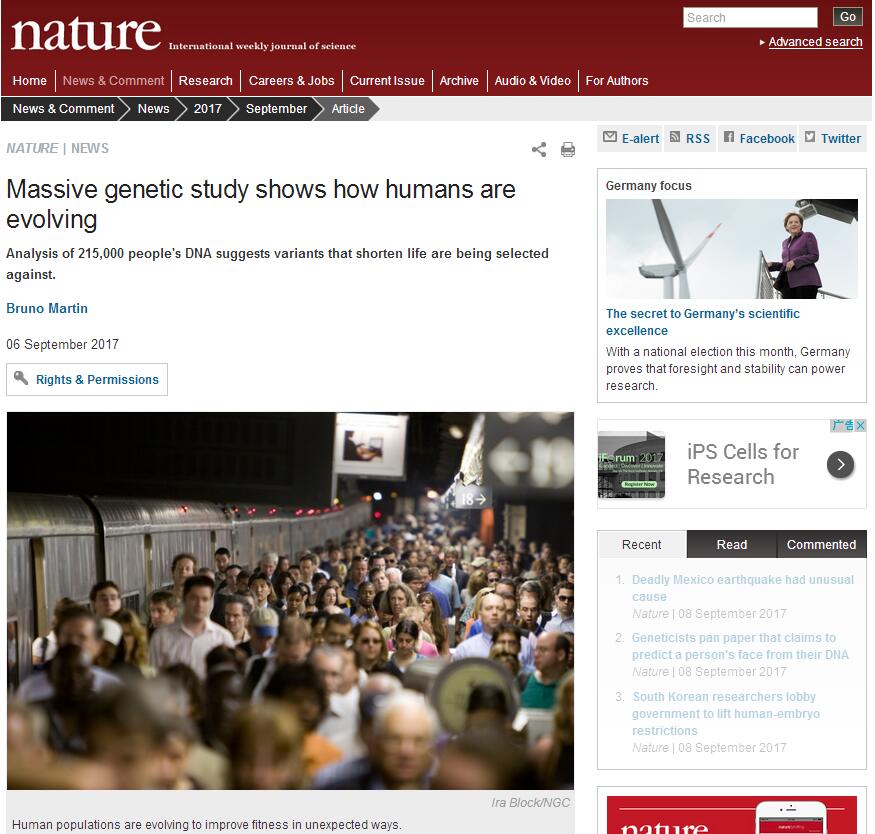博文
Nature:自然选择正在试图摆脱危害人类生存的有害基因突变!
|
215,000人的DNA分析结果表明,使人类寿命缩短的突变正在被人类群体所淘汰,换言之,自然选择正在使危害人类生存的有害基因突变丢失。相关研究结果发表在《PLoS Biology》期刊上(Identifying genetic variants that affect viability inlarge cohorts)。
研究人员对大型基因组数据库进行了筛查,筛查了超过800万个常见基因突变,结果发现APOE和CHRNA3基因突变随年龄增长变得越来越少。APOE基因突变与阿尔兹海默症强烈相关,在70岁以上女性基因组中十分罕见;CHRNA3基因突变与男性重度吸烟有关,从中年人开始,该突变逐渐消失;这说明带有这两个有害突变的人群死亡比例很高,没有这两种基因突变的人群活的更长。作者认为,人类基因组中肯定具有大量的此类突变,这也说明其他基因突变可能已经被自然选择从人群中清除了。新闻报道原文见:http://www.nature.com/news/massive-genetic-study-shows-how-humans-are-evolving-1.22565


新闻报道原文:
Massive genetic study shows how humans are evolvingA huge genetic study that sought to pinpoint how the human genome is evolving suggests that natural selection is getting rid of harmful genetic mutationsthat shorten people’s lives. The work, published in PLoS Biology, analysed DNA from 215,000 people and is one of the first attempts to probe directly how humansare evolving over one or two generations.
To identify which bits of the human genome might be evolving, researchers scoured large US and UK genetic databases for mutations whose prevalence changed acrossdifferent age groups. For each person, the parents’ age of death was recordedas a measure of longevity, or their own age in some cases. “If a genetic variantinfluences survival, its frequency should change with the age of the surviving individuals,” says Hakhamanesh Mostafavi, an evolutionary biologist at ColumbiaUniversity in New York City who led the study. People who carry a harmful genetic variant die at a higher rate, so the variant becomes rarer in the olderportion of the population.
Mostafaviand his colleagues tested more than 8 million common mutations, and found twothat seemed to become less prevalent with age. A variant of the APOEgene, which is strongly linked to Alzheimer’s disease, was rarely found in women over 70. And a mutation in the CHRNA3 gene associated with heavy smoking in menpetered out in the population starting in middle age. People without thesemutations have a survival edge and are more likely to live longer, the researchers suggest.
This is not, by itself, evidence of evolution at work. In evolutionary terms, havinga long life isn’t as important as having a reproductively fruitful one, with many children who survive into adulthood and birth their own offspring. So harmful mutations that exert their effects after reproductive age could beexpected to be ‘neutral’ in the eyes of evolution, and not selected against. But if that were the case, there would be plenty of such mutations still kickingaround in the genome, the authors argue. That such a large study found only twostrongly suggests that evolution is “weeding” them out, says Mostafavi, andthat others have probably already been purged from the population by natural selection.
Links to longevity
Whythese late-acting mutations might lower a person’s genetic fitness — their ability to reproduce and spread their genes — remains an open question.
The authors suggest that for men, it could be that those who live longer can have more children, but this is unlikely to be the whole story. So scientists are considering two other explanations for why longevity is important. First, parents surviving into old age in good health can care for their children andgrandchildren, increasing the later generations’ chances of surviving and reproducing. This is sometimes known as the ‘grandmother hypothesis’, and may explain why humans tend to live long after menopause.
Second, it’s possible that genetic variants that are explicitly bad in old age are alsoharmful — but more subtly — earlier in life. “You would need extremely large samples to see these small effects,” says Iain Mathieson, a populationgeneticist at the University of Pennsylvania in Philadelphia, so that’s whyit’s not yet possible to tell whether this is the case.
The researchers also found that certain groups of genetic mutations, which individually would not have a measurable effect but together accounted for health threats, appeared less often in people who were expected to have long life spans than in those who weren't. These included predispositions to asthma, high body mass index and high cholesterol. Most surprising, however, was the finding that sets of mutations that delay puberty and childbearing are more prevalent in long-lived people.
Tosee a genetic link to delayed childbearing is intriguing, says JonathanPritchard, a geneticist at Standford University in California. The link between longevity and latefertility has been spotted before, but those studies could not discount the effects ofwealth and education, because people with high levels of both tend to havechildren later in life. The latest genetic evidence makes Pritchard think thereis an evolutionary trade-off between fertility and longevity, which had previously been studied only in other animals. “To actually find this in humansis really pretty cool,” he says. “I think it's a really nice study.”
Studying ongoing evolution in humans is notoriously difficult. Scientists who want too bserve selection directly would need to measure the frequency of a mutation inone generation, and then again in all that generation’s children and, better still, grandchildren, says Gil McVean, a statistical geneticist at the University of Oxford, UK. “That would be very hard to do well,” he says. “Youwould need vast samples”.
Nature doi:10.1038/nature.2017.22565
https://blog.sciencenet.cn/blog-3319332-1075411.html
上一篇:20170912——毛萼口红花(Aeschynanthus radicans)
下一篇:20170913——金鱼吊兰(Nematanthus wettsteinii)